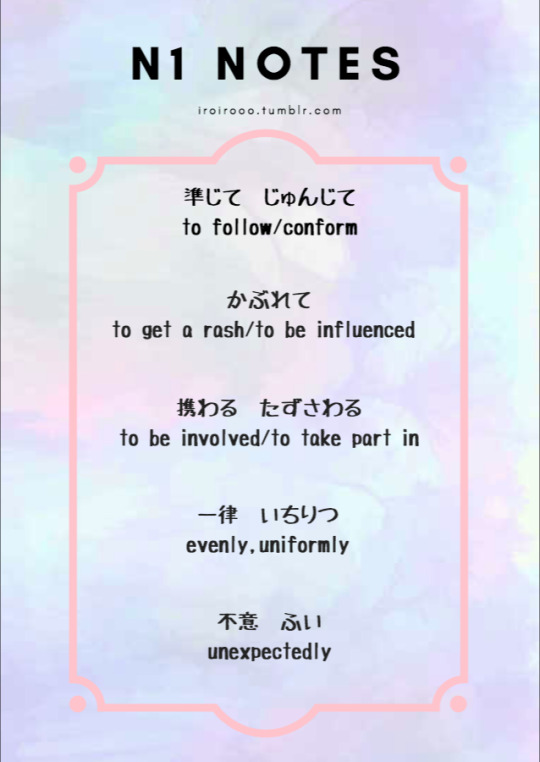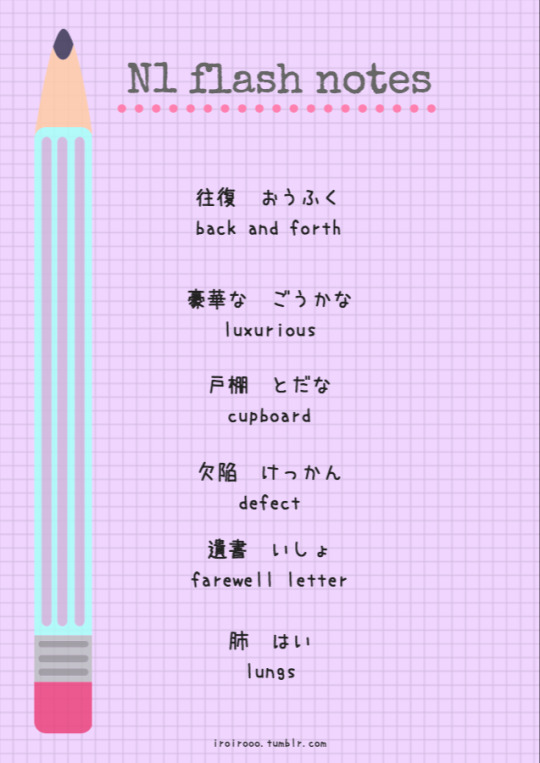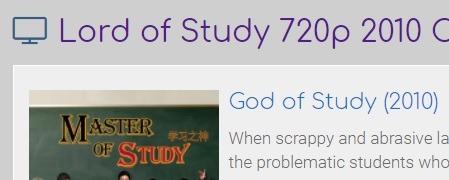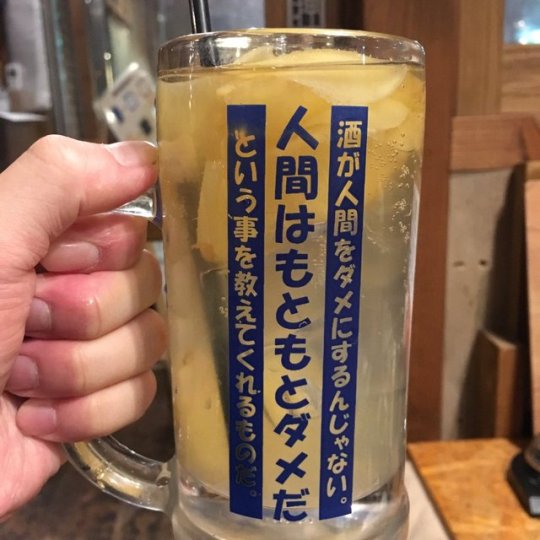Photo








3.3.2017//
I haven’t been making any Japanese poster notes like this but anyway this is a compilation of my notes for convenient reference! c: I usually save them in one folder after making one!
351 notes
·
View notes
Text
japanese emojis — meaning
emoji – meaning – origin
🈁️ here – ココ
🈂️ service – サービス
🈷️ month/moon – 月 (げつ / がつ / つき)
🈚️ free of charge / there isn’t – 無料 (むりょう) / 無し (なし)
🈶️ not free of charge / there is – 有料 (ゆうりょう) / 有り (あり)
🈯️ reserved – 指定 (してい)
🉐️ bargain – 得 (とく)
🈹️ discount – 割引 (わりびき)
🈲️ prohibited – 禁止 (きんし)
🉑️ acceptable – 可 (か)
🈸️ application – 申請 (しんせい)
🈴️ passing grade – 合格 (ごうかく)
🈳️ vacancy – 空室 (くうしつ)
🈵️ no vacancy – 満室 (まんしつ)
㊗️ congratulations – お祝い (おいわい)
㊙️ secret – 秘密 (ひみつ)
🈺️ open for business – 営業 (えいぎょう)
💮 well done/good job – 大変よくできました (たいへんよくできました)
3K notes
·
View notes
Text
Spot the difference
辛い vs 幸い
鋭い vs 鈍い
文字 vs 文学
苦手 vs 若手
温度 vs 湿度
旅行 vs 施行
仲間 vs 中間
制作 vs 製作
署名 vs 著名
固体 vs 個体
陽気 vs 陰気

辛い 「からい」 spicy; or 「つらい」 (emotionally) tough, bitter, cruel
幸い 「さいわい」 luck, happiness; often as 幸いに luckily, fortunately
鋭い 「するどい」 sharp (blade, pain, mind, etc.)
鈍い 「にぶい」 dull (blade, taste, etc.); also 「のろい」 slow, stupid
文字 「もじ」 letter, character
文学 「ぶんがく」 literature
苦手 「にがて」 poor, not good (like at sports, with kids, etc.)
若手 「わかて」 young person
温度 「おんど」 temperature level
湿度 「しつど」 humidity level
旅行 「りょこう」 travel, journey
施行 「しこう」 executing, enforcing (law, act, etc.)
仲間 「なかま」 fellow, mate, comrade
中間 「ちゅうかん」 midterm, midway
制作 「せいさく」 work, production (book, movie, etc.)
製作 「せいさく」 production, manufacture
署名 「しょめい」 signature
著名 「ちょめい」 well-known, famous, eminent
固体 「こたい」 solid body, solid state (of a substance)
個体 「こたい」 individual, specimen
陽気 「ようき」 merry, cheerful; weather
陰気 「いんき」 gloomy, melancholy
These two also represent 陰 yin and 陽 yang ☯
2K notes
·
View notes
Photo

Following a recommendation from @lovelybluepanda for kdrama.
Seems like they couldn’t decide on a translation....
28 notes
·
View notes
Text
I passed N2 on my 4th try
So don't give up. I'm a lazy fuck who doesn't get anything done ever, but the trick is to just never give up, and keep trodding along. You'll get there eventually, no matter how slow you go.
Now I guess I'm writing N1 next cause I still fucking suck.
14 notes
·
View notes
Text
what the fuck is this vocab. This is madness. I'm absolutely adding this to my anki.
Eclipse Vocabulary

太陽 (たいよう、taiyou) - sun
月 (つき、tsuki) - moon
地球 (ちきゅう、chikyuu) - earth
光球 (こうきゅう、koukyuu) - photosphere (bright, visible surface of the sun)
食年 (しょくねん、shokunen) - eclipse year
金環食 (きんかんしょく、kinkanshoku) - annual (solar) eclipse
食の季節 (しょくのきせつ、shoku no kisetsu) - eclipse season
食 (しょく、shoku) - eclipse
日食 (にっしょく、nisshoku) - solar eclipse
月食 (げっしょく、gesshoku) - lunar eclipse
皆既 (かいき、kaiki) - totality, where the sun is covered by the moon (solar eclipse) or the moon is in the earth’s shadow (lunar eclipse)
皆既食 (かいきしょく、kaikishoku) - total eclipse
部分食 (ぶぶんしょく、bubunshoku) - partial eclipse
To be more specific, the previous two can also become 皆既日食 (total solar eclipse), 皆既月食 (total lunar eclipse), 部分日食 (partial solar eclipse), 部分月食 (partial lunar eclipse).
隠す (かくす、kakusu) - to hide
皆既帯 (かいきおび、kaikiobi) - path of totality (the path the moon’s shadow travels the earth during an eclipse).
光環 (こうかん、koukan) - corona
軌道 (きどう、kidou) - orbit
本影 (ほんえい、hon’ei) - umbra (a complete shadow)
半影 (はんえい、han’ei) - penumbra (part of a shadow)
疑本影 (ぎほんえい、gihon’ei) - antumbra (part of the moon’s shadow that extends beyond umbra)
3K notes
·
View notes
Text
Japanese Foot Phrases 足

あげ足をとる 「あげあしをとる」 - 他人の言い方のあやまりをとらえ、皮肉った言い方をすること
To nitpick
足が地につく 「あしをちにつく」 - 浮ついておらず、落ち着いていて、着実なこと
To be down to earth,
足が出る 「あしがでる」 - 予算以上に費用がかかること
To exceed the budget.
足もとにもおよばない 「あしもとにもおよばない」 - 相手が自分よりも数段すぐれていること
To be no match for (someone)
足もとを見る 「 あしもとをみる 」- 相手の弱みを見すかすこと
To take advantage of someone’s weaknesses
足もとにつけこむ 「 あしもとにつけこむ 」 - 相手の弱みにつけ込むことTo take advantage of someone’s weaknesses
足を洗う 「 あしをあらう 」 - 悪い仕事や行動をやめること
To wash one’s hands of something
足を引っぱる 「 あしをひっぱる 」 - 他人の成功をじゃますること
To get in someone’s way
足が棒になる 「 あしがぼうになる 」 - 歩き回りすぎて、くたびれること
To be worn out from walking
浮足立つ 「 うきあしだつ 」- 逃げ腰になり、落ち着きなくそわそわした様子になること
To be ready to run (away)
二の足を踏む 「 にのあしをふむ 」 - ためらうこと、迷うこと
To hesitate
足元から鳥が立つ「 あしもとからとりがたつ 」 - 身近に意外な事が起こる。急に慌てて行動を始める。
To be abrupt
足を奪われる 「 あしをうばわれる 」 ― 災害や事故、ストライキなどによって、交通機関が利用できなくなってしまう。
To be stranded
足をすくう 「 あしをすくう 」 - 相手のすきをつき、失敗させる。
To trip someone up (make them fail)
足を向けて寝られない 「 あしをむけてねられない 」 - 尊敬する人や恩義を受けた人に対し。その気持ちを忘れない。
To be indebted to someone
2K notes
·
View notes
Text
Is there a Japanese language learning discord server? and if there isn’t, would anyone be interested in one if I made it?
#I joined them all#Last one seems chill with alot of advanced learners#Please msg me so I can add you if you are on discord too!#japanese#langblr#discord#jlpt
35 notes
·
View notes
Text
Video game vocab in Japanese

刀剣 [とうけん] - sword, dagger
銀 [ぎん] - silver
鋼 [はがね] - steel
斧 [おの] - axe
弓 [ゆみ] - bow
武器 [ぶき] - weapon
殺す [ころす] - to kill
助けて [たすけて] - help!
村 [むら] - village
探求 [たんきゅう] - quest
獣 [けもの] - beast
化け物 [ばけもの] monster, apparition, ghost
魔法 [まほう] - magic
草本 [そうほん] - herbs
錬金術 [ れんきんじゅつ] - alchemy
死体 [したい] - corpse
戦士 [せんし] - warrior
魔法使い [まほうつかい] - witch, sorcerer, mage
血 [ち] - blood
待ち伏せ [まちぶせ] - ambush
落とし穴 [おとしあな] - trap
十字路 [じゅうじろ] - crossroads
洞窟 [どうくつ] - cave
森 [もり] - forest
暗殺者 [あんさつしゃ] - assassin
傭兵 [ようへい] - mercenary
僧 [そう] - priest
護衛 [ごえい] - guard
王様 [おうさま] - king
女王 [じょおう] - queen
吸血鬼 [きゅうけつき] - vampire
狼男 [おおかみおとこ] - werewolf
亭主 [ていしゅ] - innkeeper
1K notes
·
View notes
Text
Kokuhaku
Reading Kokuhaku, just because it came in the mail and I was curious. The vocabulary is okay-ish, but the prose is sometimes hard to figure out because the author uses indirect speech most of the time. Contemplating whether to read English - Japanese in parallel. Won't it make it too easy? On the other hand I hate it if I don't understand the details in a mystery novel. Anyone else read/reading that novel in Japanese?
3 notes
·
View notes
Text
You shouldn't learn single Kanji readings bcs, yaknow, that one ONyomi reading will only be used 90% of the time, and you'll never be able to read that one word that has a really obscure reading...
#do what works for you#But honestly learning readings by studying vocab must have been the worst advice I ever got#It slowed down my progress so much#My brain just has problems multi-tasking I suppose#Kanji#jlpt#Jlpt n2#langblr#japanese
2 notes
·
View notes
Text
未恋女子
未恋女子 (みれんじょし) - a woman that’s not interested in love/relationships
277 notes
·
View notes
Quote
アホにつける薬なし
アホにつけるくすりなし
there’s no medicine for stupidity
(via nihongogogo)
2K notes
·
View notes
Text
Japanese learners be like
N5-N3 examinees: I can read THIS MANY mangas with out a dictionary *holds up fingers* and i watched my favorite disney movie without the subtitles, PRAISE ME I AM LORD OF JAPANESE, MINNA SAN 頑張ってね!
N2 examinees: okay im not the best at japanese, but i definitely dont suck at this point, s/o to my gf for helping me out with my listening comprehension aye
N1 examinees: bro lemme get your anki cards theyre gonna toss in some archaic grammar shit on this round i feel it
#N2 is definitely the level where you feel the most incompetent imo#the strugge is real#i'm crying#jlpt#jlpt n2
280 notes
·
View notes
Text
Studying Japanese
Was writing up this post for something on reddit, but I figured some people might find it useful here. This is basically my “Japanese Studying” history condensed into survey form. I often get asked how I got started and how I learned and this is basically of summary of how I go about it along with some advice I would give people looking back at my own experience.
1. Out of 10, roughly how skilled are you in the following areas (1 is absolute beginner and 10 is native level fluency):
Speaking: 7 Listening: 8 Reading: 9 Writing: 7 Grammar: 9
2. How long have you been studying Japanese? 4.5 Years. 2 in college, got good grades but only studied with an aim of doing well on the tests. The rest has been as primarily an Elementary/Kindergarten ALT in somewhat rural Japan, a fairly immersive setting where I don’t really have any coworkers who can speak anything beyond rudimentary English.
3. What’s your Japanese vocabulary?
15k+ I’d say.
4. Why are you learning Japanese? I want to achieve near fluency and be able to use Japanese alongside my business/economics degree (and hopefully a future MBA) in the business world.
5. What resources do you use to study? I use Anki for an hour+ every day while writing everything down with a pencil and paper except for the most basic kanji and the hiragana/katakana-only words.
I used the first two text books in the Yokoso! Series in college. Pretty good.
The only textbook I have used in Japan is the Minna no Nihongo Intermediate II Textbook at a local volunteer 日本語教室. It was also good. Nowadays I mostly read newspaper articles there.
I am a big fan of the Kanken (漢字検定) exams because they expose you to lots of useful kanji, sentences, idioms, and opposite pairs that you might not otherwise see in textbooks made for foreigners. I just study the practice exam books, putting everything I don’t know how to write or read into a Anki deck. In 2 years I have been able to work my way up from level 8 to level 3 and am currently studying for the pre-2 and level 2 exams.
I am fortunate (for my career and language goals) to work in a place where basically the only English I speak is with my elementary students in class every week. All my work/meetings at school are conducted in Japanese, I make my lesson plans in Japanese, and while I do my best to expose my students to English and international culture, all my time spent playing at recess, eating lunch, or volunteering afterschool is pretty much free Japanese practice time with eager conversational partners.
I am a fan of Japanese Vocaloid music and for the past few years my hobby has been translating and subbing Vocaloid songs and videos for foreign fans to enjoy. You can find some of my work by looking up “descentsubs” on YT but unless you are into anime-type stuff you might not find it interesting at all.
I am also in an English Novel Translation group. We slowly translate novels (currently Animal Farm) into Japanese. I am the “English Advisor”, helping with English metaphors, idoms, colloquial sayings, and archaic grammar, and the Japanese members correct my translations which is really helpful because while I have improved enough to not actually make many actual mistakes anymore, my Japanese writing is not at all “natural” so I get tons of advice on how actual Japanese people would reword the translations I create.
6. How many hours per week do you actively spend studying?
Anki and Kanken studying usually adds up to about 14 hours a week. I spend a good 4-5 hours on my translating hobby, a few hours reading, and another 3-4 hours at my Japanese class or Translation circle each week. As long as you have a smartphone/dictionary near you, anytime can be study time though.
7. Do you tend to focus more on reading & writing, or speaking and listening?
I have to do all 4 of them currently for my job, but listening and reading are the most important. People can still largely understand you if you write or speak poorly (and I make plenty of minor mistakes every time I open my mouth) but there are no “easy documents” or “easy meetings/lectures/conversations” in the workplace, you either got to know it or you don’t when the moment comes. My solution to dealing with this is to focus on increasing my vocabulary over everything else with grammar given secondary priority.
8. What country do you live in?
Fukushima, Japan
10. Any final words for beginners and fellow /r/learnjapanese folk?
-Lots of people talk about how things like Kanken or JLPT aren’t real indicators of Japanese fluency and they are not, but what they are is excellent goals to help keep yourself motivated and honest as you move forward.
-Anki is an amazing program. It really works and if you stick with it every day you see real results. I only started using it 1.5 years ago and I regret that greatly. Back them I was between N2-N3 in level from accumulated experience, but once I started digesting some essential lists (JLPT N3, N2, N1 Kanji/Vocab lists, the Japan Elementary School kanji list, Core 6000) my life changed in a huge way. I was able to functionally (if slowly and painstakingly at times) read basically everything in my daily life and work environment. I finally started understanding enough Japanese to better know what I DIDN’T know. I could listen to a conversation or read something and understand it to the point that I could easily begin to realize things like “oh, I didn’t catch that one word” or “what is the nuance of that grammar he just used?”. That is when you really start getting on the path towards functional fluency.
-To go along with the last point, BUILD YOUR VOCABULARY (語彙力)! Until at least the N3 level I do think it is important to go along with a textbook like Genki or Minna no Nihongo to help understand the fundamentals of Japanese grammar and build a good base that will allow you to move forward into advanced levels. But once you are able to process the majority of basic grammar forms, pure vocab and kanji rapidly outpaces the usefulness of the grammar points you will encounter in high level textbooks and study materials, even for N2 and N1. While I may hear (or poorly try to use) something like ~ざるを得ない or 揚げ句 once a week, I am constantly bombarded with vocab from even my youngest elementary students (including bug, flower, food, and objects names) that really strains my memory because I don’t have the same life experiences as them. The only way to make up for that lack of experience is to STUDY YOUR ASS OFF! This doesn’t mean you don’t study grammar, but rather from the intermediate level on you should mostly look up grammar when you don’t understand something, don’t waste time studying chapters full of expressions that you may almost never use. Let your real experiences start to dictate what grammar you look up, learn, remember, and use. I never studied grammar by rote for either N2 or N1 and passed just fine using this approach.
-Finally, the only thing that will make these last 2 points worth your time is to find a way to apply your Japanese on a daily basis. Read books, read manga, watch anime, find conversation partners, translate songs, move to Japan, whatever. Anki and drilling are effective but what they really do is get things floating around in your head that are now ready to make a real life connection and be truly remembered. Pretty much every difficult word or phrase I have been able to learn and make my own to use in daily conversation over the past few years has started with memorizing in Anki and THEN encountering it once or twice in conversation or reading, having that A-HA! moment, and finally grasping what it really means. Whether you are in Japan or not, this “application”-phase of Japanese study can take all kinds of forms, just find something that suits your interests. I’m not a big anime fan but I disagree with some people who say “anime doesn’t teach you real Japanese”. If you approach anime or manga with a “I want to understand everything approach” and not just remember words like “senpai”, “dokidoki”, and “kawaii” you will learn and progress. It really doesn’t matter, just find SOME way to live and experience Japanese constantly.
-(For advanced learners) Once I got far along enough in Japanese to make heads and tails of my daily life over here, I couldn’t shake the ever present desire to want to understand EVERYTHING and not be perplexed by things Japanese people do without second thought. I am constantly looking up stuff I encounter. See a sign you can’t read completely? Look it up. Listening to your drunk boss ramble on at the enkai about stuff you don’t care about? Look it up while doing あいずち. Stuck at a meeting or event that doesn’t really apply to you? Silently aim for 100% comprehension trying to jot down every word that you didn’t understand. You won’t be able to do this all the time, but when life or work allows it, turn parts of everyday life into listening or reading exercises. This “looking up” habit is similar to using Anki; it primes your brain and breeds familiarity, just waiting for your next encounter with a newly learned word or phrase to cement it into your memory. Chances are that if it is worth remembering and you continue to watch the same kinds of shows or work in the same workplace it WILL come up again.
-Language is a never-ending process. Learning it is also progresses extremely unevenly when approaching the language as an outsider who didn’t grow up immersed in the culture. After these few years of hard work, I can show my elementary school students how to write any kanji or phrase in their homework, I can out-do the middle schoolers in town for the most part as well, I can dazzle adults with my knowledge of 四字熟語 but in the end, I am not native and never will be. I’m still not anywhere remotely close. All I need to do to prove it is open my mouth for a few seconds and speak Japanese. But it doesn’t matter. Learning this language has provided me with all kinds of amazing human connections, wonderful memories, and a new outlook on my future life and goals after years of fighting depression through college. Good luck and keep grinding!
#sry this is long#but also just rly good advice and motivation#if you wanna advance in this language hell you gotta bust your ass studying vocab#Ppl who write kanji repetitively and make cutesy grammar notes come fight me on this
436 notes
·
View notes


